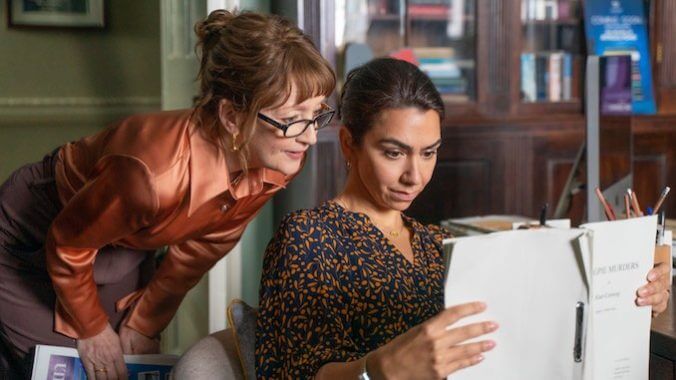Anthony Horowitz Has Done It Again: Magpie Murders Is a Delightful Meta Mystery on PBS
Photo Courtesy of PBS Masterpiece Mystery
There are few audiobooks that have bowled me over as completely as Anthony Horowitz’s Magpie Murders did when I first listened it several years ago.
It wasn’t because the novel’s plotting was especially tight (although it is), nor was it because the “meta twist” that serves as its scaffolding is approached with a light enough touch to avoid coming off as a twee gimmick (although that’s true, too). Rather, it was because the casting (featuring Samantha Bond and Allan Corduner) and production choices made by HarperAudio, when combined with the whole Horowitz-in-his-prime package and the moody Mid-Atlantic autumn I was driving around listening to it all in, made for an experience so visceral that it literally had me shifting freelance gears and pitching brand new audiobook coverage right here at Paste.
As I wrote then, when adding the title to the list of the Best Audiobooks of 2017:
Mysteries are almost made for audiobooks, as they benefit from the fact that you can’t flip ahead to read the ending. This benefits the reader twice over in Magpie Murders, as the gimmick is that a famous mystery writer’s editor is reading the writer’s latest manuscript—only to find that the writer has died and the manuscript is unfinished. This leaves the editor to chase down the book’s and the writer’s endings on her own. Horowitz effectively differentiates between his book and the book within the book by changing tense and POV (one is first person past, the other third person present). But this audio production [adds to the effect by] employing two different narrators, making for a very effective differentiation between the two stories—and a very jarring jolt back to “reality” with each narrator switch. The mysteries are good, but it’s the narrative experience that makes them great.
Leaving aside the implication that I’m a person who regularly flips ahead to read books’ endings (sorry! I just hate tension!), the creative inflexibility that makes the audiobook format so good for twisty mysteries is just as true of television. And where an audiobook can capitalize on an author’s shrewd stylistic choices by, say, producing the two halves of a bifurcated mystery as though they were two distinct audiobooks entirely, a television series can do the same, but with visuals.
Which is why I was so excited to hear that Britbox—the five-year-old collaborative streaming service from the BBC and ITV—was planning to adapt it as a Britbox Original series, and even more excited when it transpired that it would Horowitz, himself, doing the adaptation. Author of more than 50 detective novels and spy thrillers, including the wildly popular Alex Rider series, Horowitz is *also* the screenwriter (and often creator) behind some of the best British crime and mystery dramas of the last couple decades. Murder in Mind? New Blood? Foyle’s War? All Horowitz creations, all very good. Equally solid, the updated reimagining of Alex Rider that he brought to Amazon Freevee in late 2020.
Which is all to say, if Magpie Murders was ever going to be as twistily compelling on the screen as it is on the page and in audio, Horowitz had maybe the best chance possible of pulling it off.
If this sounds like the set-up to a disappointing review, it’s not! Having reviewed all six episodes of the Britbox series—which, a bit confusingly, is due to premiere for American audiences on PBS this coming Sunday as part of this October’s Masterpiece Mystery! lineup—I am happy to say that it is extremely good. Stars Lesley Manville, Conleth Hill, and Tim McMullan are compelling in their respective roles as crime editor-turned-chance sleuth Susan Ryeland, her nightmare star author-turned-murder victim Alan Conway, and the coolly meticulous post-war detective Atticus Pünd at the heart of Conway’s award-winning whodunnit series, whose final, unfinished adventure is what kicks Susan into mystery-solving mode to begin with. Similarly good are director Peter Cattaneo and cinematographer Anna Valdez-Hanks, who skillfully shepherd the viewer between Susan’s “real” investigation in the present day and Pünd’s “fictional” one in the 1950s by flooding Susan’s world with clear, natural light, and steeping Pünd’s in a warm gold that calls to mind the Golden Age of British Detective Fiction that Alan Conway’s books so blatantly call back to.